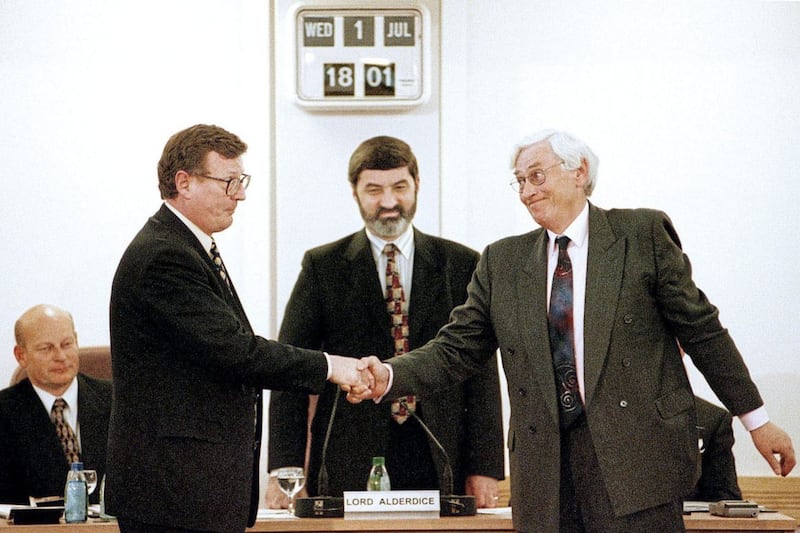REPORTS that the unionist community felt nationalists had benefited from IRA violence and were angered by the Anglo-Irish Agreement caused concern in the British government.
Newly-released documents from 1993 show the government was alarmed by two reports - one from a US diplomat which pointed to widespread alienation and "a sense of betrayal" among unionists, and another by University of Ulster academics which showed the unionist community was unhappy at talks between Sinn Féin leader Gerry Adams and SDLP leader John Hume.
The UU report, which involved interviews with religious leaders, community activists and business people across the north, found that unionists wanted the British government to get rid of the Anglo-Irish Agreement, ignore Mr Adams and the Irish government and promote a peace deal which "respected the views of the Protestant majority".
It also highlighted a dislike of fair employment legislation and a belief that Protestants were now being discriminated against.
The report found that unionists across the social spectrum felt alienated although the middle classes "disguised it better".
Unionists felt the Anglo-Irish agreement had broken the "contract" between them and Britain. They were also angered by the Hume-Adams talks.
"It is clear that the position of John Hume is central to Protestant thinking," the report said.
"He is always referred to as a figure of power – almost superstitiously. The implication is that he is very clever... and not to be trusted."
In a March 1993 note, US diplomat Doug Archard told the Northern Ireland Office that "Protestants now believe republican violence had paid in terms of both advancing the nationalist political agenda and seeing more resources under government schemes such as targeting social need".
Mr Archard said he had some sympathy with unionists, saying "even when the Protestant community organised itself to promote development in loyalist areas, ministers, senior officials and Unionist MPs were noticeable by their absence".
The US diplomat said he had sought to persuade officials in the Republic's Department of Foreign Affairs of the "extent of unease" in the unionist community but "had been dismayed to find the DFA dismissive".
Read More
- UVF 'had secret talks with IRA which discussed federal Ireland'
- John Hume concerned by release of republican prisoners from Portlaoise after IRA ceasefire
- Bill Clinton was 'more forthcoming' to nationalists than British wanted
Read More
- Gerry Adams was 'dispensable' and 'no Mandela', Ken Maginnis told Bill Clinton adviser
- Withdrawal of funding from Irish language group 'sparked huge row'
Read More
- Row over planned restoration of Co Armagh birthplace of Orange Order
- Orange Order berated Sir Patrick Mayhew over 'cannibals' remark
- Ian Paisley Jnr 'wanted Stormont government which could negotiate with Republic'
Read More
- Mary Robinson's 1993 meeting with Gerry Adams 'angered British government'
- British government 'repeatedly tried to block Gerry Adams's US visa in 1994'
- Records reveal British criticism of Republic's response to Gibraltar deaths
Read More
- Thatcher 'accused Irish government of doing nothing' over suspected IRA priest
- Irish government queried bulk postal discount for Sinn Féin over IRA funding fears
- MPs demanded date to withdraw from Ireland after murders of British soldiers
Read More
- Secretary of state Tom King walked out of meeting after row with SDLP over devolution
- Margaret Thatcher said Garda was 'not a highly professional police force'
- Farm security gates at Irish border sparked allegations of discrimination against Catholics








